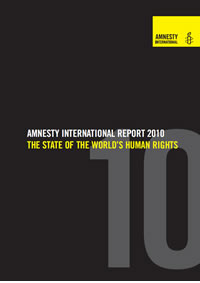Book Notes
 Amnesty International Report 2010: The State of the World's Human Rights (London: Amnesty International Publications, 2010), 403pp.
Amnesty International Report 2010: The State of the World's Human Rights (London: Amnesty International Publications, 2010), 403pp.
"Speak up for those who cannot speak for themselves," reads Proverbs 31:8, "for the rights of all who are destitute." That's what the annual reports from Amnesty International do. The current report covers the year 2009. A brief foreword by Amnesty's interim Secretary General Claudio Cordone gives an overview of notable achievements and stubborn obstacles for human rights for all people. Cordone's foreword is followed by five regional overviews, each about ten pages long: Africa, Americas, Asia-Pacific, Europe and Central Asia, and then the Middle East and North Africa. The bulk of the report then gives two-page summaries of 159 countries (pp. 55–360).
In 2009, a democratically-elected former head of state was sent to prison for twenty-five years for crimes against humanity (Alberto Fujimori of Peru), while another sitting head of state was named in an arrest warrant for war crimes and crimes against humanity (Omar Al Bashir of Sudan). Accountability rather than impunity is the goal. But two major obstacles continually thwart this goal, says Cordone. First, a handful of powerful states place themselves outside and above the law: "although 110 states ratified the Rome Statue to the ICC by the end of 2009, only 12 of the G20 countries had done so." Second, states manipulate the law for political expedience, and shield their allies from scrutiny, as when the African Union refused to co-operate with the charges against Bashir.
A report of this sort necessarily sacrifices deep analysis of complex issues in favor of breadth of coverage. But the report pulls no punches and plays no favorites. It is comprehensive in its notion of human rights, whether civil, economic, social, political, cultural, or (to a lesser extent) religious. I especially appreciated the mention of many small and generally unknown atrocities that never make the news, along with the emphasis that civilians bear the brunt of human rights abuses. This point is underscored by a dozen or so powerful photographs interspersed throughout the text — wooden shacks built on the rubble of demolished homes in Egypt, women and children escaping conflict in northwest Pakistan, pregnant women awaiting health care in Sierra Leone, and police brutality against demonstrators in Honduras. The report also notes that not only governments and para-military groups but also global businesses wield immense power over people's lives with little accountability.
All human beings deserve all human rights. But the end of public rape, repression of dissent, forcible expulsions and returns, renditions, torture, and the like will come only to the extent that we emphasize our own responsibilities to secure those rights. Human rights begin with the end of apathy and indifference, when we "speak up for those who cannot speak for themselves, for the rights of all who are destitute."


